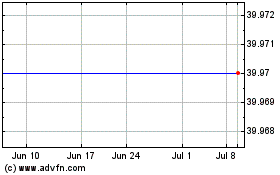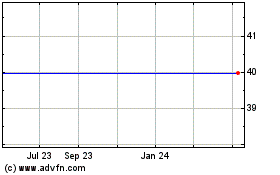But look out: Many 'no loads' are loaded with other fees
By Daisy Maxey
Mutual-fund investors may soon see changes on the shelves of
fund supermarkets: No-load share classes are likely to dominate the
offerings because of a new government conflict-of-interest rule
aimed at financial advisers.
The rule, which takes effect in April and requires advisers
offering retirement-investment advice to put clients' needs ahead
of their own, is expected to reshape the distribution of mutual
funds and accelerate the demise of loads, or the fees fund firms
charge investors to compensate brokers for selling the funds.
On its face, it is a positive development for investors, who
likely will be able to buy funds more cheaply and better understand
what they are paying for.
Persistence of 12b-1 fees
But there is still reason for investors to be wary. Many no-load
funds will continue to carry marketing or distribution charges
known as 12b-1 fees, embedded in the fund's expense ratio. A fund
can charge investors a 12b-1 fee of 0.25% annually and still call
itself a no-load or no-commission fund.
Among the 19,598 noninstitutional mutual-fund share classes
tracked by investment researcher Morningstar, 4,218 charge no loads
and no 12b-1 fees. (Most are available only in certain 401(k) plans
or through financial advisers who charge by assets under
management, Morningstar says.) An additional 2,485 share classes
have no loads but charge 12b-1 fees of 0.25% a year, or $250 a year
for every $100,000 invested.
"It's messy to have these sales charges wrapped up in the fund's
expenses," says John Rekenthaler, vice president of research at
Morningstar. Investors would have a clearer idea of what they're
paying and to whom if distribution costs were separated completely
from investment-management costs, he says.
Some experts say that over time, the Labor Department's new
fiduciary rule and an era of greater transparency could begin
chipping away at 12b-1 distribution fees just as they have with
loads.
Loads have been under pressure for years, leading fund companies
in many cases to waive them. The new fiduciary rule is adding to
the pressure by encouraging distributors -- including fund
supermarkets (platforms that permit investors to buy and sell funds
from hundreds of companies), major brokerage firms, independent and
regional broker-dealers, and bank-and-trust companies -- to add
no-load-fund share classes to their offerings.
From 2010 through 2015, investors pulled more than $641 billion
from load share classes and invested $1.42 trillion in new money in
no-load share classes, according to the Investment Company
Institute, a mutual-fund trade group. This year through September,
investors have pulled an estimated net $113 billion from mutual
fund A shares, or those that charge a sales fee up front,
Morningstar says.
Many investment managers, meanwhile, are preparing for the
possibility of an even more sweeping rule next year. The Securities
and Exchange Commission may require brokerage firms and advisers to
apply the fiduciary standard across the board to all investors,
says Denise Valentine, a senior analyst on wealth management at
Aite Group.
To better position themselves, many mutual-fund companies are
filing with regulators to create lower-fee or no-load share classes
or discussing with their distributors what type of share class they
want to offer clients.
Do it the ETF way?
For now, distributors continue to embrace fund share classes
with 12b-1 distribution fees.
Broker Charles Schwab Corp. stopped selling fund share classes
with front-end sales loads in May, but continues to offer an array
of funds "with and without a 12b-1" fees, it says. The firm
declined to reveal how much of its business comes from share
classes with 12b-1 fees.
It would be much clearer for investors, says Mr. Rekenthaler, if
the brokerage firm itself charged the distribution fee, and fund
companies stopped wrapping it in with their expenses. "That's how
it works with an ETF."
Capital Group's American Funds appears headed in that
direction.
In late October, the firm filed with regulators to create a new
fund share class that will be free of commissions, 12b-1 fees and
so-called "sub-transfer-agency fees," which are typically paid to a
transfer agent for mundane tasks such as calculating cost basis.
The firm hopes to offer the new share class early next year.
"This is our first offering to the individual investor that will
have a management-fee structure as opposed to any structure that
will go back to compensate for any expense or 12b-1, etc.," says
Matthew O'Connor, head of distribution at American Funds.
The new environment is demanding fee transparency and
simplicity, he says.
Sales of fund shares with 12b-1 fees also are diminishing at
Prudential Investments, part of the investment-management business
of Prudential Financial Inc. The firm says two share classes that
charge no loads or 12b-1 fees now account for 75% of the firm's
gross sales.
Legg Mason Global Asset Management declined to break out its
sales by load or no-load fund shares classes, but says about
three-quarters of new inflows in recent years have gone to two
share classes that charge no loads or 12b-1 fees.
At the end of the day, the client will have to pay for
distribution, but it's likely to be a clearly disclosed charge,
says Ms. Valentine of the Aite Group.
Ms. Maxey is a reporter for The Wall Street Journal in New York.
Email her at daisy.maxey@wsj.com.
(END) Dow Jones Newswires
November 07, 2016 02:49 ET (07:49 GMT)
Copyright (c) 2016 Dow Jones & Company, Inc.
TD Ameritrade (NASDAQ:AMTD)
Historical Stock Chart
From Mar 2024 to Apr 2024

TD Ameritrade (NASDAQ:AMTD)
Historical Stock Chart
From Apr 2023 to Apr 2024
